Articles sur la recherche et la transmission de savoirs pour une consommation, une demande plus propre : Insijam
2022 – Espagne : Un safari por el Paleolítico
2022 – Espagne : Érase una vez el hombre
2022 – France : Quel sens pour une carrière d’ingénieur et l’engagement professionnel aujourd’hui ?
2022 – France : Commune Planète
2022 – France : Romorantin : Xavier Auclair “sème des graines” dans l’esprit des collégiens
Articles sur le développement d’une offre d’énergie plus propre : KarmSolar
2025 – Egypte : Energie solaire sur RFL
2023 – Egypte : Egypt’s Solar Energy Company KarmSolar Secures $3 Million From HSBC
2022 – Egypte : Solar power in Africa on the rise
2022 – Egypte : KarmSolar announces new minority stake round
2021 – Egypte : KarmSolar is making renewable energy accessible in Egypt
2019 – Egypte : KarmSolar: An Egyptian startup experience in massive solar power investment
2015 – Egypte : The social enterprise sector in Egypt: Current status and the way forward
2014 – Egypte : The need for foresight in an ever changing world
2013 – Egypte : Following the sun
2013 – Egypte : KarmSolar, the power of the sun
2012 – Egypte : KarmSolar: Building Partnerships and Providing Cheap Sustainable Solutions
2012 – Egypte : An Egyptian startup wants to move farmers into the sun
2012 – Egypte : Reaching for the Sun
2012 – Egypte : KarmSolar develops renewable energy for ‘off grid farmers’
Un safari por el Paleolítico
6 novembre 2022
Voici le lien vers l’article :https://elpais.com/eps/2022-11-06/un-safari-por-el-paleolitico.html
En voici la partie concernant l’immersion que nous avons réalisée sous l’organisation de Werner Pfeifer sur le terrain de Paelolítico Vivo, dirigé par Eduardo et Fani Cerdá, près d’Atapuerca en Espagne :
«

JUAN MILLÁS
El canto del cárabo rompe la quietud del susurro de las hojas en una noche plagada de estrellas. Bajo la bóveda celeste, un grupo de aventureros se protege dentro de vivacs, cubiertos con pieles curtidas de los gélidos seis grados presentes ya a comienzos del otoño burgalés. Frente al crepitar de las llamas conversan sobre las huellas de lobo que han rastreado por la mañana y cuentan historias alrededor de la hoguera. “No esperábamos pasar tanto frío en España, no hemos venido lo suficientemente equipados”, relata Werner Pfeifer, profesor de la Edad de Piedra en el museo arqueológico al aire libre Steinzeitpark Dithmarschen, al norte de Alemania. Envuelto en una chaqueta de piel de foca y unas botas de piel de búfalo, Werner, más conocido como Stone Age Man, ha organizado una experiencia inmersiva en la Prehistoria en medio de la reserva. “Si alguien viajara del Paleolítico a ahora mismo y nos viera, comprobaría que no ha cambiado nada”, resume como principal objetivo del encuentro. Porque la estampa en Salgüero es el testimonio vivo de un verdadero salto en el tiempo. Un grupo de arqueólogos y profesores, maestros curtidores y talladores de piedra —llegados de Francia, Alemania y Portugal—, experimentando de forma “total” la vida de nuestros ancestros. Con pieles de corzo y jabalí, que ellos mismos han trabajado, como única ropa.
Durante 15 días han salido adelante en pleno bosque, sin modernidades, teniendo como base un campamento nómada. Recolectando bellotas, endrinas, majuelos y moras. Haciendo fuego con yesca y pedernal. Siguiendo los preceptos del bushcraft, un movimiento que nació hace varias décadas en Estados Unidos y que consiste en adquirir las habilidades necesarias para resistir en la naturaleza (preparar un refugio, cazar, orientarse, conseguir comida) haciendo uso de los recursos disponibles en el entorno natural. En Europa se llevan haciendo encuentros de este tipo desde hace al menos 20 años. También son habituales los cursos y talleres de pago para apasionados de lo salvaje donde se imparten técnicas de supervivencia. En España es una de las primeras reuniones extremas que se celebran sin ánimo de lucro. Tan solo un grupo de apasionados del pasado, vestidos al estilo de los Picapiedra, experimentando la vida de hace miles de años, para luego regresar a sus museos y aplicar los nuevos conocimientos adquiridos. De hecho, los únicos objetos modernos que se permiten son una cámara de vídeo para documentar, una libreta y un bolígrafo.
La rutina diaria empieza con los primeros rayos de sol y la visita de los uros, que se acercan curiosos a pocos metros del campamento. Para el desayuno echan mano de sus propias provisiones. Carne de caza mayor ahumada o salada, pescado deshidratado, algunos frutos secos y algas. “Nosotros les regalamos una pata de jamón de siete kilos y ahí la tienen, colgada de un árbol, y le van sacando filetes”, explican desde Paleolítico Vivo. Después de la primera comida del día, una parte del grupo sale a “pistear” al acecho de las huellas que han dejado los animales durante la noche. Sobre todo hay zorros, corzos y jabalís. Otros se van al arroyo Salgüero a rellenar de agua las 20 vejigas de vaca que utilizan como cantimploras. También prueban suerte pescando en el río Arlanzón. Utilizan reteles hechos de sauce para cazar cangrejos, y anzuelos de piedra y hueso, con hilo de pelo de cola de caballo, para capturar truchas, barbos y bogas. Pero la mayor parte del día la dedican a la artesanía —cestería para el pescado, por ejemplo— y sobre todo a confeccionar piezas de ropa porque el frío arrecia. Utilizan tibias y fémures para obtener punzones largos con los que agujerean las pieles curtidas y logran pasar los tendones para coserlas. También utilizan sílex y obsidiana para tallar cuchillos.
El sol empieza a declinar y el grupo de portugueses empieza a preparar tres liebres despellejadas a la miel que compraron en el supermercado antes de acampar, y que se cocinan sobre las brasas de la hoguera. El humeante olor impregna todo el campamento. Tanto para las recetas como para las técnicas y procedimientos que llevan a cabo en esta experiencia, recurren al paralelo etnográfico. Es decir, copian el estilo de vida de tribus ancestrales que han llegado hasta nuestros días. Como los bosquimanos, los esquimales o los indígenas del Amazonas. Las sonrisas se contagian ante la expectativa de una suculenta cena después de un duro día de trabajo en el Paleolítico. “Mi misión en la vida es hacer que otras personas vengan para sentirse libres y salvajes”, cuenta resuelto Werner, el hombre de la Edad de Piedra.»
Auteur : Diego Sánchez, pour el País
Érase una vez el hombre
1er octobre 2022
Voici une version scannée de l’article :Article – Diario de Burgos
Voici le lien vers le début de l’article :https://www.diariodeburgos.es/Noticia/Z9E2E0BA0-B73B-0383-F0EC16C23F63A1EB/202209/Un-grupo-de-europeos-lleva-una-vida-paleolitica-en-Salguero/
En voici le contenu :
«

Un grupo de europeos se instala en Salgüero de Juarros para llevar una vida paleolítica. Comen lo que pescan y recolectan, se visten con pieles y duermen a la intemperie.
Un grupo de europeos, capitaneado por el educador de museos Werner Pfeifer, se instala 15 días en el monte de Salgüero para vivir en Paleolítico. Desconectados de la tecnología, se rigen por el sol, duermen a la intemperie, visten con pieles y cuero y se alimentan de lo que pescan y recolectan. Es su forma de reivindicar «lo natural».

Los primeros rayos de sol se cuelan entre las costuras de la techumbre, confeccionada con pieles de animales, de la improvisada cabaña donde duerme Werner Pfeifer, que se define como cazador de la Edad de Piedra, educador de museos y que es el gestor del Museum Steinzeitpark Dithmarschen en la ciudad alemana de Albersdorf. A unos cuantos metros, se han montado el resto de chozas donde descansan los demás integrantes de esta particular tribu de nómadas, conformada por alemanes, franceses y portugueses. En esta segunda semana en comunión con la naturaleza, el campamento está habitado por 9 integrantes ya que algunos tuvieron que regresar a la ‘moderna civilización’.
Han sido noches frías las de esta quincena, con temperaturas que han bajado hasta los 3 y 4 grados, pero no parece que les haya afectado ni en el cuerpo ni en el ánimo. Inmediatamente se desperezan, y sus primeras miradas se dirigen al suelo en busca de huellas de posibles animales. Hay que controlar qué fauna habita el territorio en el que se han instalado para reencontrarse con los orígenes de la humanidad y vivir en y de la naturaleza, que esparce por el monte todos sus sonidos, intensificados ante la ausencia de cualquier contaminación acústica, y que pone al alcance de sus manos los frutos del bosque con los que alimentarán sus estómagos en el desayuno como nueces, moras, endrinas, majuelos, escaramujos o acigüembres para afrontar el resto de la jornada.
Este suele comenzar cogiendo las nasas y reteles para bajar a pescar al Arlanzón y aprovechar para bañarse. De regreso al campamento, tallan la piedra y los huesos de animales para confeccionar cuencos para beber – muchos elaborados con vejiga de vaca -, platos, cazos, cucharas… o utensilios de caza, o trabajan con las pieles que se han traído para hacerse los ropajes con los que cubren sus cuerpos, y preparan la comida. El grupo está bien aprovisionado de alimentos, con una despensa a base de carne ahumada y, salada, así como pescado, semillas y otros productos deshidratados.
Esta tribu primitiva intenta durante estos 15 días vivir fielmente en la Edad de Piedra, pero es evidente que es imposible hacerlo al cien por cien. En pleno monte, no pueden hacer hogueras por el peligro que entraña para el entorno y tampoco pueden cazar animales. En cambio, sí han sacado en la Junta de Castilla y León la licencia de pesca, y ya han dado buena cuenta de unos cuantos cangrejos.
Nómadas, cazadores, pescadores, recolectores y talladores, este grupo no ha podido encontrar otro lugar mas idóneo para instalarse. Pero no ha sido al azar. A pocos kilómetros se localizan los yacimientos de Atapuerca y están asentados en el corazón del parque Paleolítico Vico; este monte dejo sin aliento a Pfeifer hace unas semanas cuando se acercó a la zona para buscar el mejor emplazamiento. No lo dudó al ver que estaba ya en un escenario paleolítico, rodeado de uros, bisontes y caballos przewalski.
El director del proyecto Paleolítico Vivo, Eduardo Cerdá, les ha brindado todas las facilidades y, de hecho, comparte algunos momentos con ellos y ha pasado una noche en el poblado. Es el mejor testigo de «que llevan esta inmersión en la Edad de Piedra a rajatabla». Pfeifer explica, además, que el lugar es ideal porque tiene cerca lo imprescindible, como los cursos de agua de los ríos Arlanzón y Salgüero, para pescar y beber, y manantiales, además del monte cerrado que les protege bastante del viento.

Esnobismo, naturalismo, experimento sociológico… Werner Pfeifer asegura que para él es una necesidad. «En un mundo en el que los días son artificiales porque se alarga la luz el tiempo que se quiere, las comidas se tratan con químicos, igual que la ropa, y en el que todo es tóxico, nosotros llevamos al extremo este tipo de vivencias para reivindicar aquellos tiempos en los que no existían todos los procesos actuales que nos han llevado a ser parásitos de la química y la tecnología. Reivindicamos una época en la que todo era real y auténtico», afirma, y apunta otra razón, la de crear comunidad, es decir, lo «hermoso» que es encontrar gente de diversas nacionalidades que como él quiera vivir de manera auténtica unos días al margen de su trabajo y sus profesiones.
En su vida ‘normal’, procura regirse por principios naturales, de tal manera que reside en una casa de madera en un árbol, cultiva su propio huerto y fincas con hortalizas y frutales, y no se excede con el azúcar por lo que le basta limpiarse los dientes con palillos y agua. Reconoce que el uso de la tecnología es inevitable, pero procura utilizarla lo menos posible. Asimismo, sus demostraciones en el museo las realiza vestido con pieles.
Tras esta experiencia en Salgüero, Pfeifer asegura que volverá, pero no antes de 2025 porque el próximo año se instalará en la selva alemana y en 2024, en Portugal.
-
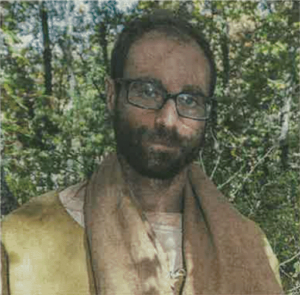
XAVIER AUCLAIR
INGENIERO (FRANCIA) -

ELENA MOSS
ARQUEÓLOGA (ALEMANIA) -
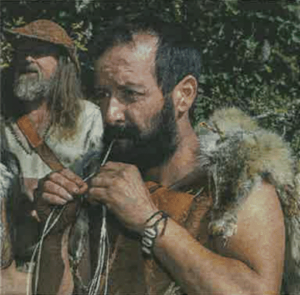
PEDRO CURA
ARQUEÓLOGO EXPERIMENTAL (PORTUGAL)
Xavier Auclair: «En la vida moderna no nos damos cuenta de que dependemos de la naturaleza, aquí se vive»
Elena Moss: «He estado en otras aventuras paleolíticas pero nunca en algo tan auténtico y natural como esto»
Pedro Cura: «Estas experiencias forman parte de mi trabajo, que es descubrir como vivían y qué hacían los prehistóricos»

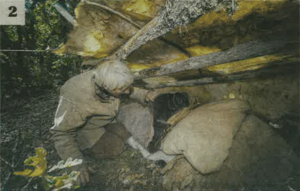
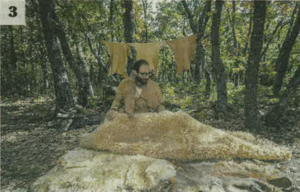
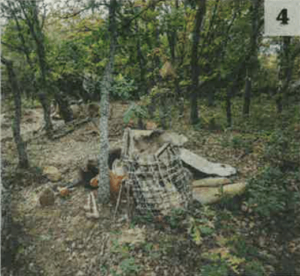

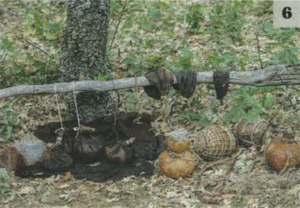
EN IMÁGENES
1. Dos integrantes de la tribu con objetos tallados. 2. Una de las cabañas habilitadas para dormir. 3. Xavier, con una gran piel de animal, con la que se tapan y fabrican prendas. 4. Nasas elaboradas por ellos con las que pescan en el Arlanzón. 5. Durante estos días aprovechan para tallar sus propios instrumentos de caza, pesca y menaje. 6. Cuencos y demás utensilios hechos con madera, silex y huesos.
Photos : PATRICIA, Diario de Burgos »
Rencontre avec Cynthia Fleury :Quel sens pour une carrière d’ingénieur et l’engagement professionnel aujourd’hui ?
13 avril 2022
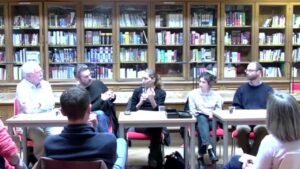
Voici la vidéo de la rencontre :https://www.canal-u.tv/chaines/minesparis-psl/rencontre-avec-cynthia-fleury-quel-sens-pour-une-carriere-d-ingenieur-et-l
Cynthia Fleury est philosophe et psychanalyste, professeure associée à l’École nationale supérieure des mines de Paris, titulaire de la chaire de philosophie à l’hôpital Sainte-Anne du Groupe Hospitalier Universitaire Paris psychiatrie et neurosciences, titulaire de la chaire Humanités et Santé au Conservatoire national des arts et métiers.
Elle a été invitée par le club Mines Environnement et Développement Durable (MEDD) et la Bibliothèque des mines de Paris à donner son éclairage sur la thématique du sens que l’on donne à sa carrière.
Les travaux de Cynthia Fleury portent notamment sur les outils de la régulation démocratique dans le domaine politique et celui de l’entreprise. Elle s’est intéressée également aux liens entre écologie et démocratie, à la conscience écosystémique. Ses livres, les Irremplaçables, Ci-Gît l’Amer, … abordent les sujets suivants : l’individuation, le pouvoir d’exister en tant qu’individu entier et social, agir en vérité, respecter l’individu au sein d’une démocratie, et non les standardisations impersonnelles, faire société, qu’est-ce que le courage, …
La rencontre, suivie de questions, a été retransmise en direct sur Internet et les participants, tant dans la salle que par Internet, ont pu poser des questions. Ont notamment été évoqués les leviers individuels et collectifs pour dépasser les crises actuelles et (ré)imaginer le métier d’ingénieur ou d’autres métiers, pour envisager d’autres futurs possibles.
Animateur : Cédric Dalmasso, enseignant-chercheur au Centre de Gestion Scientifique des mines de Paris.
Intervenants auprès de Cynthia Fleury : Inès Malot, élève en troisième année aux mines de Paris et animatrice de la Fresque pour le climat, Xavier Auclair (en activité, fondateur d’une école de basses technologies naturelles et locales, Insijam (insijam.org), après avoir co-fondé une entreprise innovante d’énergie solaire et de construction de bâtiments solaire passifs en pierre et argile, KarmSolar (karmsolar.com) et Jean-François Sautin (retraité après une carrière internationale au sein du groupe cimentier Lafarge ; les problématiques environnementales, techniques ou politiques ont jalonné chaque étape de sa carrière très diversifiée), membres du bureau du club Mines Environnement et Développement Durable (MEDD) et co-organisateurs de l’événement, avec le club MEDD et la bibliothèque des mines de Paris, et représentant trois générations d’ingénieurs.
Commune Planète
29 janvier 2022
Voici le lien vers l’émission :https://rcf.fr/ecologie-et-solidarite/commune-planete-touraine?episode=201716/
Vous pouvez aussi l’écouter ici :
En voici le contenu :
« Xavier Auclair, ingénieur des mines de Paris, ancien économiste et co-fondateur d’une entreprise innovante d’énergie solaire en Egypte, KarmSolar, nous raconte sa reconversion en artisan nature, formateur en artisanat naturel et local et intervenant pour sensibiliser des jeunes et adultes avec son école de la nature, Insijam – voir chaque instant comme une prière.
RCF.
Julie Jourdain : Bonjour, et bienvenue à tous dans l’émission Commune Planète, inspirée de Laudato Si, l’Encyclique du pape François. Donc aujourd’hui nous accueillons un nouvel invité, Xavier Auclair. Xavier Auclair, est-ce que tu peux te présenter s’il-te-plaît ?
Xavier Auclair : Oui, bonjour. Donc je m’appelle Xavier Auclair, j’ai 38 ans, je suis de Tours, où j’ai vécu jusqu’à mes 18 ans, et j’y suis revenu il y a deux ans. Je suis un ingénieur généraliste, j’ai travaillé en économie, j’ai co-fondé une entreprise d’énergie solaire, et maintenant je fonde une école de la nature, basée sur les basses technologies.
Julie : Très bien. Et est-ce que tu aurais une phrase, une citation, un mot inspirant, que tu voudrais nous partager, ce matin ?
Xavier : Alors oui. Donc l’Encyclique sur l’écologie du pape c’est un texte qui me parle beaucoup, que mes voisins, Alban et Colombe Courtot, m’avaient offert, et il se trouve que Moitessier, dans son livre La longue route, parle aussi du pape, et c’est un beau passage, que je vais vous lire :
“Le Grillon chante clair dans le jardin. Le Rat me regarde gravement. Alors je rêve que le hippy inconnu de Singapour part voir le Pape et lui dit :
“Un copain termine son bouquin, et il a demandé que ses droits vous soient versés. Il espère que vous emploierez cette goutte d’eau pour aider à reconstruire le monde en luttant avec tout le poids de votre foi en l’homme aux côtés des Va-nu-pieds, des Vagabonds, des Amis de la Terre. Tous ceux-là savent que le destin de l’homme est lié à notre planète, qui est un être vivant, comme nous. C’est pour ça qu’ils marchent sur les chemins de la Terre et veulent la protéger. Ils pressentent que c’est elle qui permettra à l’humanité de toutes les Eglises de retrouver la Source de l’univers, dont le Monstre nous a coupé.”
Le Pape est tout étonné. Il se demande comment le va-nu-pieds est entré dans son palais si bien gardé. Alors il voit une petite Mouette Blanche posée sur le bras de son fauteuil. Et il comprend que c’est elle qui l’a fait entrer en cachette. Il est content, il se sentait un peu seul ce soir. Et il offre un siège à son hôte.
[…]
Le Pape sourit. Il aime les Va-nu-pieds et les Vagabonds, ils lui rappellent les débuts de la Chrétienté, du temps où c’était simple. Alors, il lui offre une tasse de thé.”
Julie : Merci.
Xavier : Ah oui et puis je rappelle que Moitessier c’était un navigateur. Il a fait …, il a battu le record du tour du monde en solitaire à la voile et au lieu d’aller prendre son prix en Angleterre il a continué, préféré une moitié de tour du monde, pour aller vivre dans le Pacifique.
Julie : Très bien, merci. Donc ingénieur, inspiré sur la nature, comme tu disais tout à l’heure dans ta présentation, on y reviendra. Mais j’ai entendu dire aussi que tu étais acteur, que tu jouais dans une pièce de théâtre, le rôle d’un personnage. Est-ce que tu peux nous en parler ?
Xavier : Oui, la pièce de théâtre s’appelle Coup de Chapeau. Elle a été écrite par Marie Cherrier, qui est chanteuse aussi. C’est une pièce écrite en vers, c’est très bien écrit. On est tout un groupe. Il y a Dalia Royo, qui est décoratrice et souffleuse. Il y a toi, Julie Jourdain, qui est aussi actrice dans cette pièce, tu joues le rôle de la Fille du Magnat des Affaires, il y a Jean-Michel Besnard, qui joue le Magnat des Affaires, il y a une personne qui joue le rôle de l’Autre, et puis il y a moi qui joue le rôle du Garçon. Donc l’idée c’est qu’un jeune homme aimerait changer le monde, améliorer les choses, sauf que ça c’est une tâche très difficile évidemment à réaliser. Donc il est souvent découragé, face à l’ampleur de la tâche à faire, ou face à ses imperfections. Et un être, qu’on appelle l’Autre, lui dit qu’il a bien raison d’être découragé, qu’il faut penser à soi-même et être pragmatique dans la vie, et qu’on ne peut pas vraiment faire confiance aux gens. Et au contraire, un autre être, qu’on appelle l’Homme au Chapeau, qui est joué par Marie Cherrier, essaie de lui réinsuffler du courage. Et ensuite il va rencontrer une jeune femme qui elle aussi voudrait changer le monde, voilà.
Julie : Bien, merci. Donc cette pièce de théâtre, dans laquelle tu joues, a un lien avec ton activité, dans ce que tu fais, dans la vie de tous les jours.
Xavier : Alors, oui, […] c’est sûr que, je suis ingénieur, je pense qu’il y a beaucoup d’ingénieurs, et de façon générale beaucoup de gens, qui ont un peu une sorte de besoin de sens dans notre société, il y a eu de telles transformations rapides. Et puis on voit bien que notamment sur le plan écologique et aussi sur le plan social il y a pas mal de choses qui posent question dans le monde d’aujourd’hui, oui.
Julie : Alors, justement, qu’est-ce que …, quelle est l’activité professionnelle que tu mets en place aujourd’hui ? Avant, ingénieur généraliste, et aujourd’hui ?
Xavier : Alors, donc, d’abord j’ai commencé ma carrière à Paris en économie [en 2006], je faisais du conseil en stratégie. Là j’ai vu, un, on va dire, un certain haut niveau de décision, de très grands groupes, ou des investisseurs, qui peuvent mettre plusieurs milliards d’euros, personnellement, sur la table, comment ça se passait, comment est-ce qu’on décide d’investir ou de désinvestir dans les grands groupes, dans le monde. Et, ce que j’ai vu, c’était un monde qu’on pourrait qualifier de déshumanisé, où il n’y a que les mathématiques qui comptent et le profit financier, et absolument pas, il n’y a pas la profondeur de savoir quelles sont les conséquences sur les êtres humains derrière, ou sur la nature. Donc c’est une sorte d’exploitation, extrêmement abstraite dans les concepts, avec des vraies conséquences réelles. Au tout début ce n’était pas comme ça, et puis petit à petit ils m’ont mis sur des missions de plus en plus comme ça. Ils m’ont nommé l’expert en économie du cabinet, ce que je n’étais pas, mais du coup j’ai eu accès à des missions assez spéciales. Et du coup j’ai demissionné, parce que évidemment cela ne me correspondait pas.
Et ensuite je suis allé vivre en Egypte, j’ai appris l’arabe là-bas. J’ai aussi navigué à la voile dans le Pacifique. Et puis, ensuite, j’ai fondé, avec des amis égyptiens, une entreprise d’énergie solaire innovante [en 2011]. J’étais en charge de l’innovation, du développement technique et des opérations. L’entreprise s’appelle KarmSolar. Petit à petit c’est devenu une entreprise déjà un peu plus grande. Il y a plus de 150 personnes maintenant dedans. On a fait la première centrale d’électricité solaire du pays qui est connectée au réseau électrique national. On a fait pas mal d’innovation, il y a des brevets etc. Alors j’aimais beaucoup mon travail. En termes d’ingénieur, et puis j’ai aussi etudié l’économie, c’était un peu la quintessence de ce que je pouvais faire. Néanmoins, j’ai bien vu que les hautes technologies ont certains problèmes. Il y a besoin de très très gros capitaux en énergie, notamment en énergie solaire. Donc c’est pas facile de sortir des logiques de la recherche de profit financier et aussi de trouver des investisseurs qui peuvent mettre plusieurs millions sur la table facilement, donc avec certaines logiques particulières. Cela m’a posé aussi beaucoup de questions. On a développé des pompes à eau à énergie solaire, et j’ai vu que les agriculteurs qui utilisaient nos solutions retiraient l’eau trop vite des puits. Du coup l’eau se salinisait. Du coup parfois ils devaient fermer leurs puits en dix ans, alors que s’ils avaient retiré l’eau plus lentement leurs puits auraient pu rester trois-cents ans. Je me suis dit nous à notre échelle, enfin à notre étape de la chaîne de valeur ajoutée, on essaie de faire mieux avec de l’énergie solaire, on a vraiment innové, on a fait de la recherche aussi avec une équipe de Princeton aux Etats-Unis, on a amené des nouvelles choses, mais au final, la façon dont le monde, je sais pas si on peut dire “capitaliste” entre guillemets, l’utilise, n’est pas si positive que ça. Donc je me suis dit, je vais laisser l’entreprise à mes partenaires, même si encore une fois j’aimais immensément mes collègues et mon travail, mais je suis en quête de quelque chose qui va plus loin.
Et du coup je suis retourné en Europe, j’ai essayé de vivre dans la nature, j’ai fait du Wwoofing, ce qu’on appelle, c’est-à-dire vivre dans des fermes, essayer d’apprendre avec les fermiers leur métier, en fait très gentiment ils nous apprennent des choses, et on travaille pour eux en échange du gîte et du couvert. Donc là notamment en Touraine j’ai travaillé à Nouans-les-Fontaines, avec une dame qui s’appelle Alexandra Dupont, la ferme des Croq’Epines. Donc elle a des chèvres et elle produit, elle a un laboratoire de transformation pour produire du fromage. J’ai travaillé avec d’autres gens aussi, qui étaient maraîchers, j’ai travaillé avec pas mal de gens en Estonie aussi. Et puis là, je me suis dit, petit à petit, en fait ce qui m’a intéressé, c’était le mode de vie des chasseurs-cueilleurs.
Julie : Ah oui, chasseurs-cueilleurs ?
Xavier : Oui, c’était un peu une sorte de quête de où est-ce qu’on va au bout de la logique ? Et finalement le bout de la logique, c’était l’étape du parcours de l’humanité pendant laquelle on n’utilisait que des matériaux vraiment naturels. Si je jette un de mes outils au sol, il va être désintégré sans pollution. Donc j’ai vécu dans une cabane en Suisse même pendant l’hiver, vraiment de façon extrêmement rustique. Il faisait moins vingt la nuit souvent et je me réveillais avec du givre sur les moustaches. J’ai aussi exploré de la méditation profonde pour essayer de comprendre pourquoi est-ce qu’il y avait ce besoin d’exploitation de la nature et des autres chez certaines personnes, qu’est-ce qui pousse à ça. Ça m’a emmené en Inde notamment. J’ai eu toute une période d’exploration.
Et depuis j’ai fondé une école de la nature, qui s’appelle Insijam, ce qui veut dire “l’harmonie” en arabe, voir l’unité de tout dans tout. Et donc là, il y a une partie formation, donc savoir faire de la vannerie, faire de la poterie, tanner des peaux, de façon entièrement naturelle, vraiment sans aucun produit chimique, sans matériaux, sans métal, savoir se repérer aux étoiles, savoir camper, avoir chaud, etc. Il y a une partie sensibilisation, qui me tient beaucoup à cœur, donc intervenir dans des collèges, dans des classes préparatoires, auprès d’adultes, sur la notion de sens qu’on veut donner à sa carrière, à son travail, sur les notions aussi de basses technologies versus les hautes technologies, quels sont les avantages et les inconvénients de chacune. Et puis il y a une partie production. Je peux produire des objets pour les vendre ou alors à but de démonstration.
Julie : Très bien, merci. Et est-ce que tu pourrais nous dire, qu’est-ce qui te pousse, qu’est-ce qui te donne cette énergie, de cet engagement, finalement, tu es dans une dimension d’écologie intégrale. Est-ce que tu peux nous dire quelle est l’énergie qui te pousse ?
Xavier : On fait ce qu’on peut. Après, ce que j’avais écrit en 2013, c’est que ma quête, c’est de voir l’unité de tout dans tout, oneness en anglais, et que chaque moment soit comme une prière. Donc c’est vrai que quand on essaie d’intégrer le fait qu’on fait aussi partie de la nature, on voit les choses différemment, et donc cela concourt à ce sentiment d’honorer la nature et tout ce qui nous entoure, et les humains aussi”.
Off : Commune Planète, aujourd’hui, je m’y mets.
Julie : Alors, vous allez pouvoir prendre un crayon et un papier, pour pouvoir marquer comment Xavier passe à l’acte, comment pour justement nous proposer, qu’est-ce que tu fais au quotidien, qu’est-ce que tu pourrais proposer, justement, pour nos auditeurs.
Xavier : Alors, il y a énormément de choses. Par exemple, depuis huit ans, je pense que n’ai à peu près pas acheté de vêtements neufs. On peut aller chez Emmaüs, c’est génial, on peut aller à l’Armée du Salut, il y a des gens aussi qui donnent des vêtements. Cela fait des années que je n’ai plus de frigo. Si l’on y réfléchit, surtout en hiver, on chauffe une pièce pour ensuite refroidir un endroit de cette pièce, donc énergétiquement on peut améliorer le bilan. Ce que je fais, même en été, je n’utilise pas de frigo, donc j’essaie de mettre la nourriture dans une pièce plus fraîche. Je peux aussi saler ou fumer de la viande ou du poisson. Quand c’est bien fait ça se conserve des années sans problème. Alors je fais ma lessive, parfois quand je n’ai pas le temps, je l’emmène au lavomatic, mais généralement je la fais à la main. Et ça c’était un secret d’une amie, Claire Brondex, sur son voilier Apsara en 2010 dans le Pacifique qui m’a dit que pour que ce soit bien lavé sans aucun effort il suffit de laisser tremper le linge plusieurs heures.
Julie : Merci Xavier. Est-ce que tu aurais un mot de conclusion ?
Xavier : Oui, je ne pense que la basse technologie soit nécessairement la solution à tout. Je propose, j’ouvre des portes pour les gens. On a besoin de haute technologie pour survivre à l’échelle d’un pays, mais en tout cas je suis content de faire ce que je fais.
Julie : Merci à toi. A méditer. Bonne journée à tous.
Xavier : Merci beaucoup.
Julie : Au revoir. »
Merci à Julie Jourdain, Francis Colas, Eric Perennec, RCF Touraine.
Romorantin : Xavier Auclair “sème des graines” dans l’esprit des collégiens
7 janvier 2022
Voici le lien vers l’article :www.lanouvellerepublique.fr/romorantin/romorantin-xavier-auclair-seme-des-graines-dans-l-esprit-des-collegiens/
En voici le contenu :
«
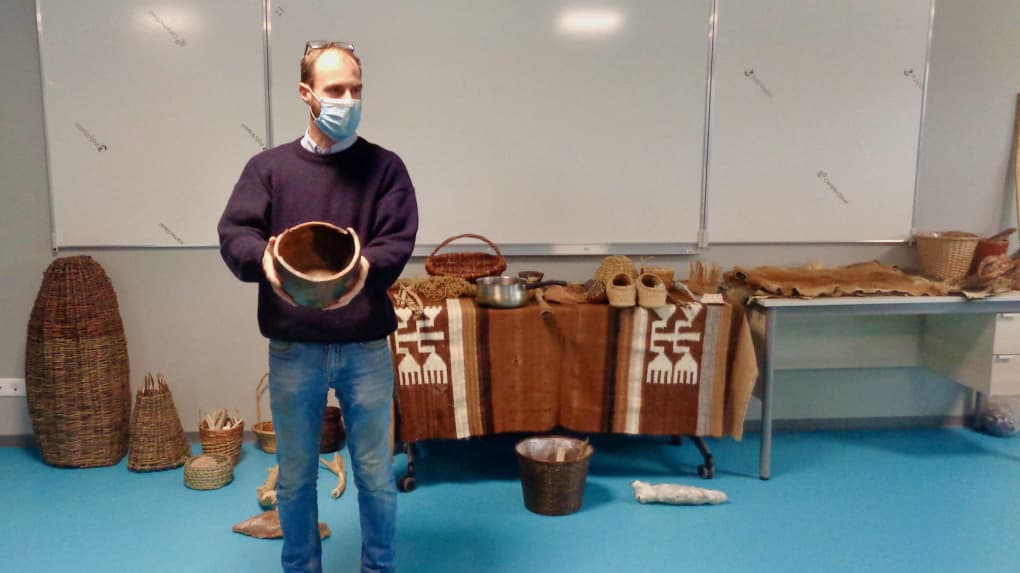
© Photo NR
A l’heure de l’orientation scolaire, des professionnels ont présenté leur métier aux élèves du collège Léonard-de-Vinci. Parmi eux, le Tourangeau Xavier Auclair. Cet ingénieur aurait pu leur vanter les hautes technologies. Mais, aujourd’hui animateur nature, il suscite la curiosité sur ce qu’offre l’environnement lors de stages et transforme les matières naturelles en objets du quotidien ou de décoration.
Sa démonstration commence par une casserole en inox avec laquelle il rappelle ce qu’est la technologie : une succession de procédés complexes d’extraction, de logistique et de transformation des matériaux à l’aide d’outils pour les façonner en objet. Il compare alors la fabrication industrielle aux techniques primitives. Dans les deux cas, l’homme est concepteur-réalisateur d’objets plus ou moins essentiels. À partir de ce constat, il se lance dans « une quête de basse technologie pour avoir une forme d’autonomie personnelle ». Pour expérimenter cette basse technologie, plus écologique, il explore la nature où il collecte des fibres, du bois, de la peau, de l’argile, des os… et s’intéresse aux techniques artisanales (vannerie, poterie, tannage…).
Sa recherche l’amène à redécouvrir les propriétés des matières environnantes, à utiliser leurs attributs et à trouver des équivalences aux objets industrialisés comme avec l’hameçon, taillé dans un os au moyen d’une pierre. Parmi ses créations, les collégiens ont observé de nombreux exemples : une nasse, un arc, un étui… Il l’admet : « Je ne m’attends pas à ce que la société s’y remette. J’ouvre des portes pour nous reconnecter à des connaissances qu’on a perdues », sans minimiser les inconvénients.
« Semer des graines »
« J’ai fondé une entreprise de recherche en énergie solaire en Égypte, raconte-t-il. Je me suis rendu compte que ça n’allait pas au bout de la démarche. L’énergie solaire, c’est moins polluant en termes d’échappement de gaz. Néanmoins, on utilise beaucoup de produits qui polluent. Plein de matériaux ne sont pas si simples à retraiter. On ne sait pas quelle entreprise va retraiter ces panneaux dans 40-50 ans. »
Plus que le métier d’animateur nature et l’artisanat, il « sème des graines » dans les esprits et permet aux jeunes d’entrevoir des pistes, la seule limite étant leur imagination.
insijam.org et artisansdenature.com »
Auteur : Rédaction Nouvelle République
Articles sur KarmSolar
Energie solaire sur RFL
5 février 2025
Abdelkader Naji organise des rencontres sur la radio RFL101.
Voici le lien vers la discussion :
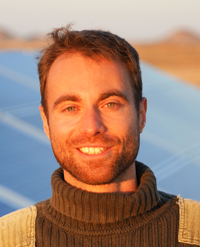
https://soundcloud.com/rfl-en-touraine/rfl101-rflreport-energie
Egypt’s Solar Energy Company KarmSolar Secures $3 Million From HSBC
10 janvier 2023
Voici le lien vers l’article :https://cairoscene.com/Business/Egypt-s-Solar-Energy-Company-KarmSolar-Secures-3-Million-From-HSBC
En voici le contenu :
« Egypt-based solar power company KarmSolar has secured $3 million in debt financing from HSBC to develop the Farafra Solar Grid. The new development is the company’s second solar grid after the Marsa Alam Solar Grid.
Founded in 2011 by Ahmed Zahran, Xavier Auclair, Yumna Madi and Randa Fahmy, KarmSolar provides numerous sectors in Egypt with renewable energy to expand the use of clean energy in the Egyptian market.
“The kickoff of the Farafra Solar Grid enables us to achieve our vision of extending affordable, reliable solar energy to relatively inaccessible parts of the country,” Ahmed Zahran, Co-Founder and CEO of KarmSolar, tells StartupScene. “It is very refreshing to see institutions like HSBC willing to focus their efforts and trust towards investing in nonconventional projects like the Farafra Solar Grid.”
According to the company, phase 1 of the project consists of a 3.4 MWp solar PV station, 3.7 MVA diesel generators, and a 4 MWh/1MW solar battery storage system. It is anticipated that the new project will provide 60% solar penetration, with the goal of reaching 100% in three years.
The new solar grid will mainly be used in the agricultural sector in the Farafra region, which mainly relies on diesel generator setups, to help bring down energy costs and reduce carbon footprint.
The company claims that the new grid will be the first of its kind microgrid solution that will use solar PV panels, battery storage system, and diesel generators in a centralized setup.
Companies opting to use phase 1 of the project include Juhanya and Nawa for Agricultural Investment to date.
The financing of the Farafra Solar Grid follows KarmSolar’s recent funding of $2.4 million to deploy battery solutions in Egypt.
The new solar project is expected to become fully operational by Q3 2023.
Egypt is a leading startup ecosystem in MENA. Despite the global funding crunch of 2022, Egypt managed to surpass total funding received in 2021, recording 205% YoY growth compared to the previous year, according to data platform Magnitt. While fintech received the lion’s share of funding, cleantech is still considered a strong emerging sector with investors like British International Investments deploying $100 in local startups to support the country’s green growth, and Egypt initiating the ClimateTech Run competition during COP27 of up to $100k for startup-finalists. »
Solar power in Africa on the rise
7 septembre 2022
Voici le lien vers l’article :https://www.borgenmagazine.com/solar-power-in-africa/
En voici le contenu :
“HAMBURG, Germany — Contradictory to what one might expect is solar power output in Africa. Africa has 60% of the world’s best global solar resources, yet logs behind with only 1% of installed solar energy capacity. In agreement, Fatih Birol, executive director of the Paris-asked energy body, says “In my view, the biggest barrier in front of African economic development is lack of energy access.” With an ever-increasing market in sustainable energy, businesses have spotted an opportunity in the industry of solar power in Africa, overcoming high import tariffs, regulatory barriers and inexperienced African solar company companies. For some, it has become a big success.
Access to Energy for Communities
As energy prices and possible shortages are a heated discussion amongst western countries currently, millions of Africans still lack basic access to electricity. In fact, half of Africa’s population cannot operate a fridge to preserve food, turn on the light when it gets dark or cool down facilities in extreme heat. With only three countries in West and Central Africa being on track to facilitate universal electricity by 2030, the impact on persisting poverty and development is daunting, according to The World Bank.
Without electricity, children can’t do their homework past sunset, economic activity is little to none and opportunities for improving human capital are once again not realized. The solution to tackling Africa’s region’s energy access crisis lies beyond the border of the West and Central African countries. Linking fragmented energy systems and investing in abundant, affordable and clean energy seems to be the way forward for universal electrification across sub-Saharan Africa, according to The World Bank.
In fact, an IEA study predicts a more hopeful future in which Africa could and should achieve universal energy access by 2030 through a yearly investment of $35 billion. Within that capacity, the study states that 90% of total energy would come from renewable energy, including solar, hydroelectric and geothermal.
KarmSolar: A Success Story
The company KarmSolar pioneered in breaking through the market for solar energy in Africa. The founders Xavier Auclair, Randy Fahmy, Yumna Madi and Ahmed Zahran developed a strategy based on the motive to help farmers in the remote Bahariya Oasis. With Bahariya Oasis being unconnected to the central grid, the solution constitutes building 33 wells for the farmland with which the farmers could power their water pumps using solar energy instead of diesel generators.
From 2015 onwards the company was quickly expanding allowing them to target other off-grid regions via a finance model under which infrastructure was repaid by clients within a 25-30-year window and as part of their tariff. A few months later, the company gained an independent power producer license, allowing for the sale of electricity from an off-grid solar station, as well as an expansion of its business model to include water desalination, construction management and architecture.
Distributed Energy System
GridX Africa, a solar power company launched in 2016, has also capitalized on remote solar facilities to provide power to construction projects, farms and safari lodges in Kenya, Mozambique and Tanzania. Its business model does not only provide power in a sustainable way but also offers a solution to power outages. In January 2022, Kenya experienced a nationwide outage, putting businesses, hospitals and essential services out of business for 24 hours. With GridX, solar systems are distributed and detached from the grid, allowing them to continue to provide power during the outage.
As headlines worldwide focus on the emerging energy problems of the west, one cannot forget about the millions of people in Africa that still do not have access to basic energy services. The solution to solving this true and present energy crisis lies in continued investment from developed regions, continued political cooperation and a unified energy grid that draws on affordable and clean energy.
Start-up companies like KarmSolar and GridX Africa have shown the path ahead now it is down to global leaders to catalyze new investments and unlock commercial potential.”
Auteur : Pauline Luetzenkirche, pour Borgen Magazine
KarmSolar announces new minority stake round
29 août 2022
Voici le lien vers l’article :https://www.wamda.com/2022/08/karmsolar-announces-new-minority-stake-round
Ainsi que le lien vers l’article en arabe :https://www.wamda.com/ar/2022/08/karmsolar-announces-new-minority-stake-round-arabic
En voici le contenu :
«
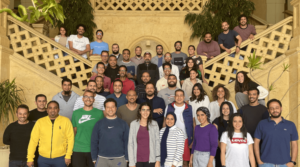
- Egypt-based solar energy company KarmSolar, has initiated a round of capital increase, supported by US-based Synergy Consulting as the sell-side advisor.
- Founded in 2011 by Ahmed Zahran, Xavier Auclair, Yumna Madi, Randa Fahmy, KarmSolar aims to enlarge the private solar energy market in Egypt, offering its integrated solutions across the industrial, agricultural, commercial and tourism sectors.
- The capital injection will fund KarmSolar’s local and regional expansion plans, support its existing power generation and distribution businesses, and enable new business verticals such as solar water desalination solutions provider KarmWater, and electric mobility venture KarmCharge to flourish.
Press release:
KarmSolar, Egypt’s leading private power utility and solar energy company, has initiated a round of capital increase to fund its local and regional expansion plans. US-based Synergy Consulting supports the new investment round as the sell-side advisor. The capital injection will support existing power generation and distribution businesses, as well as enable new business verticals such as solar water desalination solutions provider KarmWater, and electric mobility venture KarmCharge to flourish.
This comes in line with the evolution of the solar energy sector in Egypt, especially with KarmSolar’s long-term strategy to disrupt the existing utility business by developing a vertically integrated multi-utility platform with a specialization in solar power generation, as well as urban and regional power distribution.
Ahmed Zahran, CEO and co-founder of KarmSolar said: “Through the minority stake sale, we are seeking a new partner to join KarmSolar’s current shareholders and its strategic shareholder, EDF Renouvelables, in supporting the next stage of our journey. These are exciting times for the future of smart, connected utility platforms and we plan to be at the forefront of this paradigm shift in our region”.
Named by the Financial Times as one of the fastest growing companies in Egypt and 19th in Africa in 2022, KarmSolar has a strong presence across the energy value-chain from development, and generation until the distribution of power to consumers. Today the company holds a portfolio of 42 MW of secured and financed generation assets (of which 30 MW are operational) & 48 MVA of contracted distribution power capacity in the industrial, commercial, agricultural and tourism sectors (of which 12 MVA are operational).
Earlier this year, KarmSolar signed a 22 MW power distribution agreement with MARAKEZ, one of Egypt’s leading mixed-use real estate developers, for D5M, in its new mall in East Cairo. It also became the first private company to receive a permit to distribute electricity in the North Marsa Alam region by EgyptERA, signing agreements with eight resorts to join the Marsa Alam Solar grid. »
KarmSolar is making renewable energy accessible in Egypt
14 octobre 2021
Voici le lien vers l’article :https://egyptianstreets.com/2021/10/14/karmsolar-is-making-renewable-energy-accessible-in-egypt/
En voici le contenu :
”
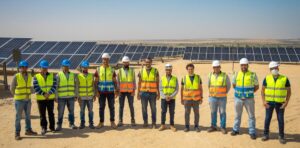
Egypt is blessed with an average of 12 hours of sunshine most of the year. Day by day, this sunshine gives off plenty of solar energy, much more than people need for their everyday lives. In the past few years, in line with the global approach towards sustainable development, the country realised the importance of utilising this solar energy.
Stemming from his belief in entrepreneurship as a form of resistance to corruption and old-fashioned business models, in 2011, Ahmed Zahran and three of his friends decided to challenge the idea that renewable energy is expensive and inaccessible; they founded KarmSolar. Zahran was previously a Finance Advisor for oil giant Shell.
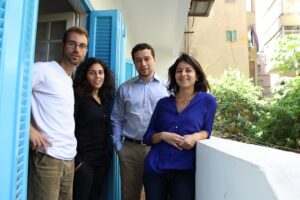
Photo via fanack
KarmSolar is a multi-utility enterprise providing off-grid solar energy and offering easy-to-use solutions in the commercial, agricultural, industrial, and hospitality sectors. Off-grid solar energy literally means meeting all your energy needs from the power of the sun alone so it is entirely self-sustaining.
“KarmSolar’s first business line was solar-powered water pumping for farms and agri-developers for which we have patents for our specially designed technology in this field. We signed our first solar water pumping project in 2012 with Fridal,” Sami El Awa, Senior Marketing & Communications Officer at KarmSolar tells Egyptian Streets.
“KarmSolar signed its first solar generation PPA (Power Purchase Agreement) with Juhayna in 2015, and joined the Feed in Tariff program in 2017 and established a station in Sahl Hashish. Today, KarmSolar operates 12 solar stations around Egypt, generating 31.4 MW of Installed Generation Capacity and 8.2MW of Distribution Capacity,” adds El Awa.
In general, a high initial investment is required to purchase a solar station, making solar power an inaccessible solution. To fix this, KarmSolar offers PPAs to make solar solutions more accessible to local companies.
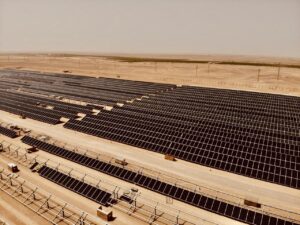
Photo via LinkedIn
“Through PPAs, KarmSolar designs, owns, and operates a solar station for the client’s facility that contributes renewable energy to their consumption, and bills clients monthly throughout the term of the contract at a significantly lower tariff than traditional electricity bills with no investment required from the client’s side,” explains El Awa.
“Technically, nothing changes for the client through a PPA except that they now have a solar energy station on their roof or land, and they’re now paying much cheaper electricity bills!”
In 2020, KarmSolar organised the KarmSolar Awards for Renewable Energy Innovations to promote solar energy among youth and introduce them to the industry.
“We are excited to host it again soon,” concludes El Awa, highlighting that the event was a huge success.
KarmSolar also includes Karm Architecture Lab (KAL), focused on energy-efficient and human-centric architecture and design. That, in addition to KarmWater, their latest division specialized in solar-powered water desalination solutions. Starting with a solar-powered water desalination project in Marsa Alam, KarmWater designs, builds, and operates solar-powered desalination stations, offering accessible fresh water to clients through Water Purchase Agreements (WPAs).
KarmSolar was recently featured among some of the most sustainable companies in the region. To learn more about them and follow their updates, click here.”
Auteur : Marina Makary, pour Egyptian Streets
KarmSolar: An Egyptian startup experience in massive solar power investment
23 juin 2019
Voici le lien vers l’article :https://emtechmena.com/karmsolar-an-egyptian-startup-experience-in-massive-solar-power-investment/
Ainsi que le lien vers l’article originel, en arabe :https://technologyreview.ae/%d9%83%d8%b1%d9%92%d9%85-%d8%b3%d9%88%d9%84%d8%a7%d8%b1-%d8%aa%d8%ac%d8%b1%d8%a8%d8%a9-%d9%85%d8%b5%d8%b1%d9%8a%d8%a9-%d9%86%d8%a7%d8%b4%d8%a6%d8%a9-%d9%81%d9%8a-%d8%a7%d9%84%d8%a7%d8%b3%d8%aa%d8%ab/
En voici le contenu :
“In 2011, three Egyptian and one French youth were let go from their positions because of the closing of the renewable energy division in their previous company. These four shared a personal passion for renewable, clean energy, a matter the only received limited interest in their country despite its vast horizons and huge opportunities. They decided to invest in the field with their own private funds, and the start-up earned its first project in a matter of months, but soon took a new and different direction from the rest of the Arab renewable energy experience.
Commonly accepted statistics indicate that global temperatures have risen by 1.9 degrees Celsius in the last 150 years and that the levels of carbon dioxide in the air have reached their maximum levels in over half a million years, with the ocean level rising by 17 centimeters. All of these are dangerous consequences of – primarily – humanity’s overuse of fossil fuels (oil, coal, gas) to generate power upon which we have built our current civilization.
In addition to these catastrophic problems, the amount of fossil fuels available on the planet is limited, and won’t last humanity a very long time, as a number of its sources are close to running empty within the coming years. On the other hand, renewable energy sources – if invested and worked upon properly – are able to replace fossil fuels completely, among these sources, particularly in the Arab world, is solar energy.
KarmSolar began its first project in Egypt’s western desert, in an area of the province of Giza called the Bahariya Oasis. The startup’s work at that point was limited to implementing one application of solar energy, using it instead of diesel fuel to operate water pumps. In desert environments that are isolated and hard to reach such as these, water becomes a highly needed resource. Because the areas are so far from the power grid, acquiring energy becomes a serious challenge, as farmers become burdened with the huge cost of sourcing fossil fuels to operate their water pumps, making solar panels an economically and practically sound option.
The startup, therefore, developed a system for this purpose called Maximum Power Point Tracking (MPPT), and registered the patent for the system in the US. The system is a more stable algorithm for controlling solar energy and dealing with its variations. As a result, KarmSolar has extracted 1.5 megawatts of total energy at the Bahariya Oasis, but its founders ambitions far exceeded this level of output.
Lara El Kalamawy – Senior Business Developer – in a discussion with MIT Technology Review Arabia informs us: “In 2018, KarmSolar was the first solar energy company in Egypt to be licensed to distribute electric power.” This license was a categorical transformation for the startup’s work, as instead of being satisfied with producing solar energy and installing its systems, KarmSolar was now part of the full stream of power production. Starting with developing energy, transporting, distribution, and connecting the user with energy, they had become on equal footing with national electrical companies that undertake to provide power at every step from A – Z.
Initially, KarmSolar was selling solar energy systems at full price, making a number of institutions hesitate to invest because of its perceived high cost, but after licensing, the company was able to buy personal plots of land to create power stations or make use of the consumers land. From there, the company sold consumers the power generated charging them only a monthly fee based on kilowatt consumption, just as the public power grid does.”We can charge our clients fees lower than that of the government,” says El Kalamawy. “We still manage to make enough of a profit, considering that solar power is the cheapest source of energy in the world right now, making it very economical.”
After some time, KarmSolar’s business and projects developed into a whole new level, among the most important of the new developments were the Juhayna Farm Project in 2015. Located in the Western Oases, the project to five months to build, and now generates enough power to cover all the needs of the farm, which produces 500 acres of crops and holds 4,000 heads of cattle. In the second stage of the project, the farm is going to expand – with the help of clean energy – to become one of the largest farms in the Arab world.
The interests of the company are not restricted to the generation and distribution of clean power, but also to a number of different applications that increase the level of harmony with our environment and nature. Among such applications is clean construction, and in 2013, KarmSolar transformed into a group of companies that manage different institutions such as KarmSolar and KarmBuild, the latter works to employ civil engineering in the service of the environment and its sustainability, using local products to lower expenses.
“KarmBuild constructs houses and buildings that use significantly less energy,” says El Kalamawy. “We achieve that through – for example – a careful study of the window placement and their number to let in sufficient light, replacing artificial light sources and reducing the consumption of electricity, maximizing the efficiency of used energy. […] Additionally, every project that KarmBuild creates must make use of solar energy through previous planning during the design stage to place solar panels in a position and angle that ensures the highest output of collected energy.”
“Currently, KarmSolar operates nine solar power stations in Egypt to regularly produce 12 MegaWatts of energy, saving the consumption of around 20,000 liters of fossil fuels a day, and capable of providing almost the entire energy needs of 2,000 households,” continues El Kalamawy. This number is only a small fraction of the future projects that the company is working on, as it has announced a number of contracts and partnerships in the last year, some of these reaching 500 million EGP (30 million USD) to build a group of solar power stations around Egypt with a total capacity of 166 megawatts, which would satisfy the total energy needs of a medium-sized city.
Despite the great success achieved by KarmSolar, which began as a startup founded by young manpower and now reaching a level of major projects worth tens of millions, there are still some established challenges. Some investors are not keen on the renewable energy sector, fearing non-traditional investments, which still poses an obstacle to the company’s growth and the launch of new projects. On the other hand, KarmSolar has reached a new standard that cannot be denied in bringing clean energy to an Arab market and developing it in a modern, responsive, and entrepreneurial manner that meets the needs of the market and allows for home in a much more secure and sustainable future economy and environment.”
Auteur : Abbad Deranieh, pour MIT Technology Review Arabia
The social enterprise sector in Egypt: Current status and the way forward
2015
Voici le lien vers le livre :https://link.springer.com/book/10.1057/9781137509956
Voici l’extrait présentant KarmSolar :
“Established in October 2011 by a group of young professionals, including some with backgrounds in multinational corporations and voluntary activities, KarmSolar is a private Egyptian company dedicated to providing innovative off-grid solar energy solutions that are commercially viable and easy-to-use in the agricultural, industrial, and business sectors. The enterprise develops systems that harness the power of the sun and replace diesel-powered processes, producing affordable, stable, reliable, and environmentally friendly energy. Karmsolar is widely recognized regionally for its innovative model and potential, including winning the first place in the HCT-Wharton Innovation Tournament, Dubai 2012 and winning second place for Harvard University’s Business Plan competition in 2013 (Solovieva, 2012). KarmSolar’s start-up funds were obtained from young professionals who believed in the cause. Its revenue is generated through contracts with clients. KarmSolar has not borrowed any loans since its inception.”
Auteurs : Raghda El Ebrashi, the German University in Cairo, et Ehaab Abdou, Wilfrid Laurier University, dans Social Entrepreneurship in the Middle East, Volume 2, édité par Dima Jamali et Alessandro Lanteri, Université américaine de Beyrouth, Palgrave Mcmillan, 2015
The need for foresight in an ever changing world
16 juillet 2014
Voici le lien vers l’article :https://aheadofthecurveblog.wordpress.com/2014/07/16/the-need-for-foresight/
En voici une partie du contenu, celle concernant KarmSolar :
“[…] We are in a constant state of evolution, with wealth, technology and innovation often at the heart of that change.[…]
In the long term, businesses do not profit from social problems.
In fact, ignoring these problems for the sake of short-term gain will lead to their eventual demise. The simple truth is that reducing environmental impact saves money in the long term. Treating workers well and following appropriate health and safety measures saves money and creates more productivity in the long term. […] without an ability to be creating multi-dimensional layers of value, your business won’t be sustainable.
The trick in all of this is to move to a mindset of foresight. […]
Business serving the betterment of society needs to become mainstream and we are getting closer and closer to that point.
[…] A little over 3 years ago two [four] bright and successful corporate executives in Egypt walked out on their jobs at a multinational to start their own small business called KarmSolar. The whole objective of which is to provide solar energy solutions to off grid communities. Now imagine how off grid communities could develop with access to energy.
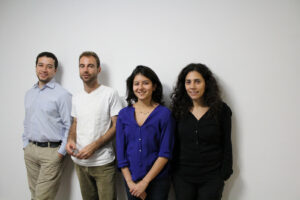
We need to find solutions to today’s problems now. To do that we need to be “ahead of the curve”, not just in how we think, but also in how we function and in how we choose to build our businesses. […]”
Auteur : Dina Sherif, Ahead of the Curve
Following the sun
Juin 2013
L’article originel n’est plus archivé sur Business Today Egypt.
Voici l’article en pdf :Article – Egyptbusinesstoday – KarmSolar
En voici le contenu :
”
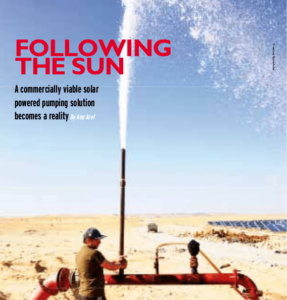
In 2012 Business Today interviewed the founders of KarmSolar, an Egyptian start-up company with a mission to develop innovative and commercially viable off-grid solar energy solutions. Their flagship product is a solar-powered water pump that can substitute the use of diesel-powered generators in pumping water from underground wells.
At the time, the company’s [co]founder and CEO, Ahmed Zahran, had pledged to make his company’s product commercially viable within a year’s time. Twelve months later, Business Today returned to KarmSolar to catch up with their developments and found Zahran had kept his promise.
A fitting context
Off-grid agricultural farms located in the desert — away from the Nile Valley and its Delta — depend heavily on diesel-powered generators to pump underground water for irrigation. With the inconsistent supply of diesel, a lack of uniformity in its price due to the existence of a black market and lower-than-expected efficiency rates leave farmers struggling to manage their energy needs. Additionally, the uncertainty surrounding the fate of diesel subsidies makes it clear that the context in which these farmers operate is in desperate need of change. Zahran explains that it is this economic context coupled with some technical innovation on his company’s part that makes their product commercially viable.
“People usually assume that by solely developing a technical solution, their product will be economic. This is not true. In order to develop a system that is competitive in the market you also have to work on economics,” says the CEO. “Economic innovation is putting the proper economic model that reflects the conditions and needs of your client.”
What KarmSolar’s clients need is a more consistent and sustainable source of energy that allows them to do away with diesel and its troubles. This substitute also must not cost them more than the price of diesel.
“Our aim is to have any off-grid agricultural or industrial project convert from diesel to solar energy while making sure that they achieve three things: reduced costs, better management and sustainability,” Zahran says.
Varying the flow
Meeting those three targets requires a great deal of technical innovation. While conventional solar systems require expensive batteries to store the generated power, KarmSolar’s system does away with these batteries altogether and therefore reduces the overall investment cost.
“Batteries fulfill two functions in a conventional solar-powered pumping solution. The first is to store the generated power and second is to act as a translator between the panels and the pump as the power cannot be consumed directly,” Zahran explains.
In partnership with WorldWater & Solar Technologies — a US-based developer of solar and water technologies — KarmSolar was able to modify the pump, allowing it to operate with a varying input of power and consequently ending the need for batteries to act as an intermediary.
“Everyone in the market was under the assumption that you need a constant level of power for the pumps to operate. We contacted the manufacturer and applied some modifications that allowed the pump to work with varying power,” says Zahran.
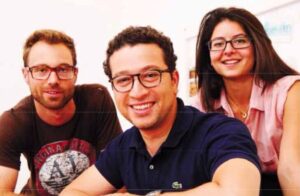
Omar Mohsen
“Using energy this way is more efficient as the system is adapted to the variability of the sun,” says Xavier Auclair, the company’s cofounder and its chief innovation and technology officer. “Other methods wait for the intensity of the sun to reach a certain level that is high enough to start the equipment and therefore they lose the early morning and sunset hours. By allowing the pump to work at lower capacities, our system utilizes the sun’s intensity throughout the entire day.”
Altering the functionality of the pump and erasing the need for batteries is not the company’s sole innovation. An in-house developed software and user interface allows farmers to accurately gauge every watt consumed and every cubic meter of water produced.
“At the moment, energy cost for an agriculture investor is a big black hole,” says Zahran. “The amount and price of diesel varies and there are no clear parameters that can be used to help farmers better manage their energy consumption.”
“Our system, however, utilizes a Solar Management Interface that lets you know exactly how many kWh consumed per meter cubic of water in addition to having the system fully automated; the pumps automatically start working at sunrise and shut down by end of day.”
Allowing the pump to operate with varying power means the amount of water produced throughout the day will also vary. As irrigation systems need a steady flow of water to operate, the water produced has to be stored in tanks.
“Producing a variable amount of water may not necessarily fit the irrigation needs of the farmer,” says Auclair. “This is why the water is stored in tanks and the irrigation system is fed from these tanks. We are, however, doing some research to overcome this,” he says.
By further developing their technology and allowing the system to bypass the storage tanks, the team will yet again be able to reduce the number of components and consequently cut costs.
In the money
At the onset, it might seem far-fetched that a solar powered water pump could actually be cheaper than using diesel given the stereotypes surrounding solar energy. However, when accounting for the running cost of a diesel generator over a five-year period the numbers start to make sense.
“The price of a diesel generator varies between LE 50,000 to LE 150,000 while our solar powered system will cost you around LE 900,000. The difference appears to be a lot. However, when you look at the amount of diesel you consume in addition to efficiency and reliability issues, our system becomes more economic,” says the CEO.
Being a start-up makes it difficult to sell the numbers to potential investors without backing it up with practical implementation. Luckily, KarmSolar found a like-minded investor who was willing to bankroll the testing period.
“We managed to find a client that shared our vision and was willing to take the risk to try out an innovation that has never been tried, at least in the Middle East and North Africa,” says cofounder Yumna Madi, the company’s commercial manager.
“Tarek AbuBakr, owner of Al Tayebat farm in the Bahareya Oasis, provided us with the space, put down the money and converted one of his wells from diesel to solar,” Madi says.
“Our system outperformed the diesel generator as we were able to reach 163 cubic meters of water per hour compared to a diesel range of 140 to 145 cubic meters per hour,” she says.
By converting a 30 kW Grundfos pump — a leading pump manufacturer — to using solar rather than diesel, the team established that over a five-year period the farm could save up to 18% in energy costs going up to 57% over 10 years.
“It’s like paying your diesel associated expenses over five-year period up-front. Even if you are fine with just paying for diesel every month, right now finding diesel itself is an issue,” says Madi.
Paying for the system up-front doesn’t have to be the only option. The people at KarmSolar are hoping to establish a scheme where the banks could finance the farmers. Money that would have been invested in a diesel generator can be paid as a down payment for the system and the monthly diesel costs could be used as installments.
“A diesel system requires an energy budget every month and so they [farmers] already have that budgeted in their income statements,” says Zahran. “All that is needed really, is for the banks to [get in on it].”
A Rewarding Environment
The working environment at KarmSolar is something that the employees proudly boast to be a part of it. While graduates would usually opt to work for well-established large enterprises to gain experience and acquire a sense of stability, the people at KarmSolar wouldn’t trade their jobs for anything.
“I graduated last January and joined KarmSolar in mid-February,” says Farida Zaki, a business developer at the firm. “Everyone here has great passion and it’s very rewarding to feel that you are helping farmers and helping your country,” she says.
The company regularly holds meetings between the different teams to share knowledge and trade experience whether in the technical or economic sides of the business. This gives the employees an exponential learning curve and makes everyone witness first hand their added value.
“We feel like we really add value to the company and we see our work being translated to growth,” says Zaki.
And growth is being achieved. What started with a paid-in capital of LE 65,000 and only four founders quickly grew to a capital of LE 13 million and employing more than 20 people.
“Working for a young company with a really good spirit and team around it really does tick all the boxes,” says Richard Barret, a UK citizen who joined KarmSolar shortly after graduating from the University of Leeds.
“What this company is doing is not just good for the market but it’s also great for technology in general. Why work for a big company when you can work for a smaller one that is very promising?” he asks.
KarmSolar serves as a model for young aspiring entrepreneurs and is a beacon of hope for the small and medium enterprises sector in Egypt. The people there have shown that with a combination of young talented professionals, hard work and innovation, anything is possible.
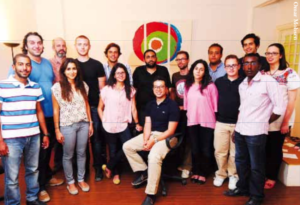
”
Auteur : Amr Aref, pour Business Today Egypt
KarmSolar, the power of the sun
1er juin 2013
Voici le lien vers l’article :https://www.enigma-mag.com/karmsolar/
En voici le contenu :
”
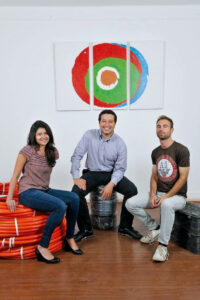
For a country like Egypt with so much sunshine, it’s surprising that we hardly have any solar energy initiatives. KarmSolar is one of the few Egyptian companies that have ventured into this, yet to be tapped, market. To succeed they needed to develop solutions that are both cost-efficient and environmentally friendly, which meant they had to overcome a host of obstacles along the way. eniGma’s Lina Ashour finds out how these young entrepreneurs are faring in their ground breaking initiative.
Ahmed Zahran, CEO of KarmSolar is not like any other entrepreneur. With KarmSolar he was venturing into a virtually untapped market. “Now that I think about it, it was such a big risk,” says Zahran. “We were heading into the complete unknown. The kind of people who work on projects like these are those who are willing to take on a challenge, learn something new, and are not entirely concerned with the money aspect,” he explains. Together with his three co-founders, Yumna Madi, Xavier AuClaire and Randa Fahmy, Zahran says they were ready to take on the challenge.
They realised early on that cost effectiveness was the only way to make solar energy a more appealing concept to companies, bank lenders, and the government.“The only way you can bring solar energy into the market is by making it cost-efficient. No one is going to invest in something just because it’s environmentally friendly,”says Yumna Madi, Chief Business Development Officer at KarmSolar.
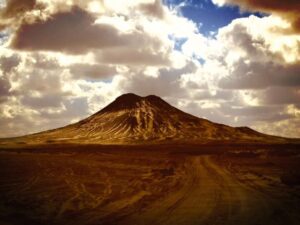
“It all started when we visited a farm in Farafra that was looking for a solution for their energy shortage problem,” says Madi. “We discovered that pumping water is one of the most energy intensive processes in agriculture. Considering that Egypt lies on the solar belt, the solution of replacing diesel engines with solar-powered pumps naturally presented itself. So through research and development we developed an off-grid water pumping solution. It’s a stand alone system that does not need a battery,” Madi notes.
Their innovative thinking was what led to their introduction of their commercially viable solar energy solution. “The main obstacle we face is the negative stigma surrounding solar energy; people think it’s really expensive or it doesn’t work,” explains Madi. KarmSolar is working hard on dispelling this stigma. Once completed, their first project entailed an actual 50 to 60 % saving in the cost of energy. At peak performance, their solar energy pump was able to outperform the diesel generator.
With energy sources in Egypt becoming increasingly unreliable, the timing of this initiative could not have been better. The long lines for diesel in the streets of Cairo are the clearest indication of the need for new energy solutions. The people behind KarmSolar are hoping to see a shift in the government’s energy strategy towards investment in solar energy and other renewable energy sources.
Chief Technical Innovation Officer, Xavier AuClair, believes that KarmSolar’s experience offers some important lessons to new entrepreneurs. “Do something that you like. If you work in something that you like, you’ll be motivated and able to energise other people around you. That’s how you create the momentum and commitment.” Zahran also has some practical advice to offer in that respect: “You’ll have fewer opportunities as you get older so you might as well take risks when you’re young. If you have an idea just go ahead and do it. Later on you’ll have more responsibilities that could make that decision much harder.””
Auteur : Lina Ashour, pour EniGma Mag
KarmSolar: Building Partnerships and Providing Cheap Sustainable Solutions
2012
Voici l’extrait concernant KarmSolar :
“KarmSolar Inc. is an Egyptian company founded in October 2011 with the sole purpose of providing cost-competitive renewable energy solutions to the Egyptian market and the MENA region. But to be able to do that, KarmSolar needed an edge, a niche, a selling point that would set it apart from the competition. Solar energy has been used for years, but it was always disregarded as a practical alternative when designing a commercial or agricultural project. This fact can be attributed to many social and economical factors; however, the main reason is the lack of awareness and understanding of the technology. It has been regarded as a space-age technology that is too expensive to be applied in industrial solutions, but this is far from the truth.
The real challenge for KarmSolar was to convince customers and consumers that solar energy is cheaper than conventional fuels. And to add to the challenges KarmSolar faced, the Egyptian government subsidizes all conventional energy sources, including natural gas, diesel, and electricity, provided by the government, making KarmSolar’s investment in solar energy appear to be an enormous undertaking at first glance. KarmSolar executives knew they could compete in the consumer products segment as a startup and could not sell universal, ready-made products that can operate under any conditions, and for these two reasons another business strategy had to be adopted.
KarmSolar’s business-to-business model is based on the provision of custom-designed commercial solar energy applications and solutions to clients in the off-grid agricultural and industrial market. The solutions are custom designed to meet the unique needs of each client, with the end goal of providing the client with a commercially viable energy solution. With a very high potential for growth and expansion, KarmSolar started creating long-lasting partnerships with its clients by providing comprehensive solutions with innovative solar energy solutions. “The key to winning clients in our field is in understanding their challenges, and in providing them with innovative and sustainable energy solutions to help them reduce their operating costs and consequently achieve their breakthrough results,” says Ahmed Zahran, KarmSolar CEO.
At this point, research had been under way for several years, and the market demand for high-capacity energy solutions was high, but solar energy could only offer small-scale capacities, and with a very high markup. Naturally, the gap was filled by diesel and natural gas generators. KarmSolar had to be innovative: “We had to customize, and come up with a turnkey innovative technology that would change people’s perception of solar energy, and we did,” says Xavier Auclair, Chief of Innovation and technology. KarmSolar’s solution utilizes the varying intensity of solar radiation to provide the highest throughput and maximize the utilization of client assets.
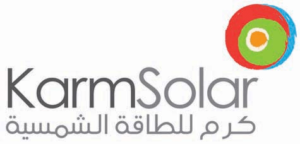
For KarmSolar’s clients, the decision to invest in a solar power generation plant is anything but easy. It is a very tiring process that involves calculating and forecasting the economics and financials of such an investment. This makes it extremely important for KarmSolar when providing the comprehensive solution to help with all financial and economical studies required for the sale. KarmSolar acts as a problem-solving partner; it has to get involved in the client’s problems to understand that client’s challenges. And this strategy has been very successful for both parties, providing mutual growth potential.
“Like any other business segment in Egypt, off-grid agriculture is highly wasteful; we do not provide solar energy as a cheaper alternative for fossil fuels only, we also help the farms understand how they are wasting their resources, like water, fertilizers, and energy, and how they can increase their efficiency and minimize their costs,” says Mohamed Fadly, KarmSolar’s Innovation Officer. KarmSolar now operates with a partnership mentality in all relationships with business clients, which in turn sell their products to the market.
Every sale for KarmSolar counts, and thus is handled with great care and attention; every project has different characteristics and conditions, which results in the complex and comprehensive nature of the solutions. For KarmSolar, it is not a sale—it is a partnership. “Our relationship with our customers is based on trust. We offer them the means to grow and increase their profitability; we engage them in the design and make sure they get what they need,” says Yumna Madi, KarmSolar’s Chief Business Development Officer. The business strategy KarmSolar uses is simple, and it is based on the mutual benefit and growth of both businesses.
KarmSolar’s competitive edge comes from its ability to stay one step ahead of the competition. Notes Madi, “We continuously invest in research and development to make sure we are always ahead of our competition. Our price is the first thing customers ask about. And we have to stay appealing.” The only way for KarmSolar, which is a top-level solar technology integrator, to keep prices down and stay competitive in the market is by innovating and driving out all losses in its solutions. “We provide trainings to the clients; we provide after sale support. And we teach them how to use our solutions effectively,” notes Madi. This wasn’t easy at the beginning, and this is why KarmSolar created a web-based software program called Solar Management Interface, or SMI. This is how KarmSolar simplifies its services and makes it easier for business clients to understand and interact with the solar power solution.
Driven by a passion to make a difference and a dream to make solar energy viable for all business sectors, KarmSolar acts as the engine for off-grid urbanization. Its products are not in your kitchen or living room, but some of your food might have been watered with solar-powered pumps as it was grown, or refrigerated by a solar-powered compressor before being shipped.”
Auteurs : Philip Kotler, Northwestern University, et Gary Armstrong, University of North Carolina, Principles of Marketing, Global Edition, Pearson Education Limited, 2012
An Egyptian startup wants to move farmers into the sun
8 novembre 2012
Voici le lien vers l’article :https://qz.com/16295/an-egyptian-startup-wants-to-move-farmers-into-the-sun-and-away-from-the-nile/
En voici le contenu :
“The Nile and its waters have historically been the lifeblood of Egypt. The country’s population occupies just 5% of the land, almost all of it along the Nile. But Egypt’s scorching deserts beyond the Nile delta hide a bounty: vast groundwater resources, which have usually been deemed not worth tapping.
Recently some farmers have begun to move outwards into the western desert to exploit the vast expanses of land, using diesel-powered pumps to pull up the groundwater for their crops. Diesel is cheap (the government subsidizes it) and the pumps run 20 hours a day. But they are noisy and polluting, and transporting diesel to these remote areas is costly and hard. “A logistical error in providing the diesel could result in powerless pumps, and therefore the loss of entire crops,” explains Xavier Auclair, co-founder of KarmSolar.
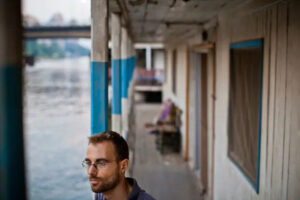
Amanda Mustard
Four years ago Auclair, an engineering graduate, was based in his home country of France working for a strategy consultancy. He did well financially and progressed rapidly up the company ladder. But a few years in he found himself sitting in a closed-door meeting with an investment firm. “600 people were to lose their jobs due to that meeting’s decisions,” he said [They told about closing 2 plants, meaning 600 people losing their jobs. In the end they did not do it, but mentioning it in a meeting was already appalling enough]. After the meeting he resigned, and spent the next four months sailing halfway across the world, eventually moving to Egypt and learning Arabic. In reaction to what he had seen at the job he left behind, he decided to use his engineering training to pursue a “more moral” line of work. He began investigating the potential of renewable energy products, and with Ahmed Zahran, a former colleague, he started KarmSolar.
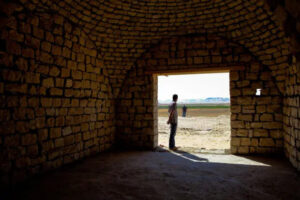
Amanda Mustard
KarmSolar hopes to persuade the farmers to swap their diesel for solar power. Egypt is considered a “sun belt” country, lying in an area that receives 1970-3200 kilowatt-hours per square meter (kWh/sq m) of solar energy each year. By comparison, India receives between 1600 and 2200 kWh/sq m per year. The photovoltaic cells convert the sun’s energy into an electric current. (A kilowatt-hour of electricity powers a standard 100-watt bulb for 10 hours, though in the conversion from solar energy to electricity some of the energy is lost.) This can then be stored in batteries or used to power the pumps.
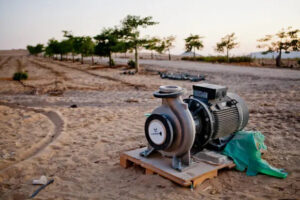
Amanda Mustard
Although Egypt has more than its share of hot sunny days, the majority of Egypt’s renewable-energy solutions have been in the fields of hydroelectricity (Aswan dam) or in wind turbines (the recently built 200 megawatt wind farm in the El Zayt Gulf on the Red Sea). In another country the government might have systems in place to help a company such as KarmSolar. But in Egypt “they are actually more of an obstacle to us,” said Auclair. “They are subsidizing their fossil fuels to such an extent that we are effectively being priced out of the competition. This is one reason why we are moving off grid.”
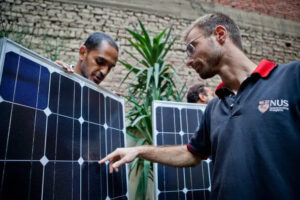
Amanda Mustard
KarmSolar has been commissioned to create a proof-of-concept “model farm” within a larger farm in the western desert, over 200 miles from Cairo. KarmSolar and its architectural partner, Green Architecture & Urbanism, spent days in the desert looking for possible sites. They want to design an area that would incorporate some 700 sq m of solar panels and a further 300 sq m for the buildings and workshop, to be built using locally procured materials.
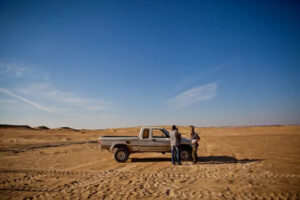
Amanda Mustard
Another partner of KarmSolar’s is WorldWater & Solar Technologies (WWST), a company based in Princeton, New Jersey, which is helping it improve its technology. As farms grow, technological hurdles appear. If a farm requires more than 20kW of solar power for its pumps, the bigger batteries needed to store the energy become much more expensive to produce and maintain, thus pricing the energy out of the market.
One of the problems with working off the grid is that every water pump needs to be designed to suit the conditions where it will be used—variations in the wind and the depth of the water table, for instance, must be considered. WWST helped KarmSolar write software that designs the farms and makes projections of their efficiency, overheads and returns, so they can pitch to potential investors.
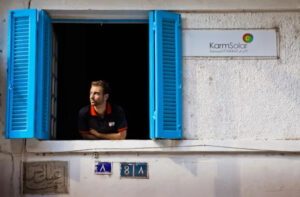
Amanda Mustard
Changing a country’s established methods takes time. Because the model farm is being built at a farm that already exists, Auclair is under no illusion that this first project will be everything he imagined. The pumps will still be using diesel power 60% of the time (due to restrictions, they can only use solar power on one well; the extra water required comes from diesel pumps). They will also be unable to implement a water-efficient, hydroponic “closed water system”; the rotary irrigation system that farmers are used to and prefer loses some ground water to evaporation.
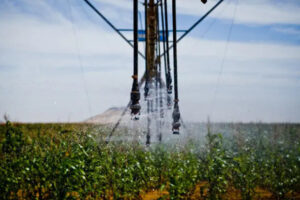
Amanda Mustard
The end goal is to one day create an entirely sustainable community off the grid. In the process Auclair hopes to create a cleaner, more sustainable Egypt by using the country’s massive quantities of land, groundwater, and sunlight, allowing farmers to be less tied to the crowded boundaries of the Nile.
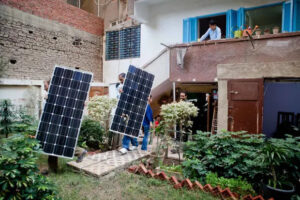
Amanda Mustard
”
Auteurs : Adam Ramsey, Amanda Mustard, pour Quartz
Reaching for the Sun
24 juin 2012
Voici le lien vers l’article :https://web.archive.org/web/20120627103553/http://www.businesstodayegypt.com/news/display/article/artId:423/Reaching-for-the-Sun/secId:5
ou https://helioscsp.com/solar-energy-in-egypt/
L’article originel n’est plus archivé sur Business Today Egypt.
En voici le contenu :
”
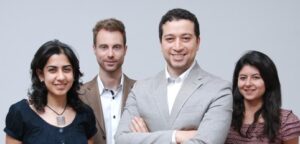
In the spring of 2012, the sun appears to be shining on the latest solar technology startup, KarmSolar. The company came to the foreground of Egypt’s technology stage on the laurels of Google’s blockbuster nine-month long Ebda competition. KarmSolar made it to the top 20 finalists, but lost the top prize to traffic reporting service Bey2ollak.
They’ve also been generating global buzz, winning the $11,000 (LE 66,440) first prize in the Wharton-HCT Innovation Tournament announced in May in Abu Dhabi. At the event, KarmSolar CEO Ahmed Zahran pledged to make the project commercially viable over the next 12 months.
“We believe our project will help modernize the agriculture sector and support sustainable food production by providing agriculture farms with an affordable and efficient solar energy solution,” he said.
This lofty goal may seem daring for a new entrepreneur anywhere in the world. But KarmSolar faces a unique set of challenges as a technology developer in an industry that has yet to convince investors it is not only “feel-good” technology of the future, but can also offer commercially viable and a consistently competitive product.
Solar epiphany
On a sunny day in March 2009 Ahmed Zahran was visiting a potato farm in Wadi El Natrun in northern Egypt. The farm had a diesel problem, a lot of potato waste and wanted him to look into using it to produce biogas as an alternative source of energy. But Zahran was not interested in the biogas, which he thought would be a logistical nightmare. Instead, he noticed the sun.
“I realized there was this fantastic source during the winter,” he recalls. “If you have this source during the winter, it must be amazing during the summer.”
So he went back to Cairo and did his research. He found out Egypt was strategically positioned within a solar belt with a very unique resource in terms of clarity of the weather that impacts productivity of a solar farm. “We have a very good solar resource, not just in terms of hours in a year but also the quality of the sun,” he says.
In fact, as one of the so-called Sun Belt countries, Egypt is unique in radiation ranging from 1,970–3,200 kWh/square meter/year from north to south, with the southern areas receiving more sun exposure, according to the New & Renewable Energy Authority (NREA) annual report. It also boasts some of the longest sunlight durations of 9-11 hours a day with few cloudy days annually.
When compared to other sources of renewable energy including wind, solar has other advantages such as storage capacity. “Energy can be stored with higher efficiency and more cost effectiveness than electricity,” says Rawya ElShazly in her feasibility study of concentrated solar power in February 2011. The study, done in association with Cairo University and University of Kassel in Germany for her master’s thesis, examines regulatory, institution and technical feasibility aspects. It concludes that solar energy has “enormous” potential in Egypt.
As conventional sources of energy are being depleted, government agencies are increasingly exploring alternatives. Domestically, Egypt is already pursuing several solar initiatives and has even taken on the regional leadership role as a host country for Regional Center for Renewable Energy and Energy Efficiency (RCREEE).
Making it efficient
Before coming back to Egypt and getting involved in renewable energy, Zahran was managing its carbon credit portfolio for Shell in London, making sure they were compliant with the carbon quotas.
“As fancy as it sounds, I realized that carbon trading is a big joke,” Zahran says. He was disillusioned by the false incentives of the carbon credits for the renewable energy initiatives and organizational fallacies that led to a market collapse. “The message was that you cannot do renewable energy and energy efficiency unless there was an incentive,” he says. “And I felt that those kinds of projects should be attractive on their own without the need for carbon credits.”
After recognizing Egypt’s potential and unique resource in solar, Zahran and the KarmSolar team became determined to make it efficient. “What we’re trying to do is to show the market that solar energy is not a fashion, it’s not something you do because you want to be good. Solar energy is a practical solution because it is abundant and because this is one of the best locations in the world for solar energy.”
The model
What KarmSolar introduced and the Wharton competition recognized was an innovative model of a solar power-generated water pumping system. The company plans to spend the prize money on commercializing the pump and making off-grid irrigation available to agricultural farms in rural Egypt that are suffering from diesel shortages.
Their basic idea was to provide
a water pumping solution that is cheaper and logistically easier using solar energy. “This region, this part of the world, is one of the biggest consumers of energy in water pumping,” Zahran explains, noting that most agricultural expansion is happening in off-grid locations in Egypt.
To make their model economical and cut down on the cost of batteries, KarmSolar made a strategic decision to replace a battery system with a water storage facility and an electronic interface developed by partner company WorldWater & Solar Technologies.
“The new system is the fraction of the cost of the cost of high-capacity solar water pumping systems” Zahran says. In addition, KarmSolar developed a software platform that would allow a farm to adapt the variability of solar power to its daily and hourly energy demands.
Xavier Auclair, a co-founder who has developed the new interface in-house, says the model could be competitive globally. “We’re not only competitive with fossil fuels, we’re even cheaper,” he says.
According to KarmSolar estimates, its solar model could save up to 60% of total cost assuming the cost of water pumping using diesel generators in 5 countries in MENA over 25 years are $24 billion (LE 144.96 billion) and the costs of water pumping using KarmSolar’s model over the same time period is $8 billion (LE 48.32 billion).
“It is a shame the region is not making use of one of its most abundant resource and keep on focusing only on the finite sources like fossil fuels,” Zahran says.
What’s missing
In the span of a few months, KarmSolar was able to accomplish an impressive feat: develop a new innovative model for water pumping, a growing team, and several high marks at international competitions. And they are gradually establishing clout within the industry as other startups targeting the agricultural sector and energy efficiency have reached out to KarmSolar to explore partnerships.
What remains elusive at this point in time is a committed investor who is willing to take the risk and bankroll the testing period. While many investors have approached KarmSolar, no one has signed on just yet.
Equally important, KarmSolar will need secure large-scale farms which the company is targeting that are also willing to take on the risk and test out the new model.
Following the elections, the new president’s office will have to tackle an array of challenges and strategic priorities. Another risk amid the regulatory uncertainty for the solar market would be where on that agenda renewable energy will emerge.”
Auteur : Daria Solovieva, pour Business Today Egypt
KarmSolar develops renewable energy for ‘off grid farmers’
22 mars 2012
Voici le lien vers l’article :https://web.archive.org/web/20120325191839/http://www.egyptindependent.com/node/726666/
ou
https://www.egypt-business.com/web/details/1212-xg-karmsolar-develops-renewable-energy-solution-for-%25e2%2580%2598off-grid%25e2%2580%2599-farmers/4480
Le lien originel : https://www.egyptindependent.com/karmsolar-develops-renewable-energy-solution–grid-farmers/semble ne plus fonctionner, peut-être en raison du traitement des caractères unicode.
En voici le contenu :
”

An Egyptian company, KarmSolar, has developed new technology that will enable “off grid” farms to use solar energy to power their high capacity water pumps.
“Off grid” refers to areas that are off of Egypt’s main power grid, which provides electricity to most of the country. However, since most of Egypt’s fertile agricultural land runs exclusively along the Nile, farmers who wish to move further out are currently forced to use diesel engines to pump the water used to irrigate their land.
Diesel engines are not only unreliable, but particularly harmful to the environment. Previously, off grid renewable energy solutions were not financially feasible to compete with these engines, but KarmSolar believes that has now changed.
At the heart of the technology are more efficient components that make better use of minimal sunlight conditions, allowing for the powering of high-capacity pumps, as well as interactive software that will allow its users to easily specify at dawn what their energy requirements will be for the day.
KarmSolar believes this will allow farmers to reduce their energy bills by 50-60 percent.
“The power generated could actually be used for anything, not only farming,” says Xavier Auclair, one of the scientists involved in the project at KarmSolar. “However, since 80 percent of diesel engines are currently being used for water pumping purposes, that was the main focus of our research.”
Auclair also says that the vision is to create what could eventually be the seed for ecovillages of the future that will be able to function regardless of their proximity to a primary power source.
KarmSolar, being just a small team of environmental scientists, is currently in the process of obtaining funding to create a pilot project that will serve as a regional demonstration.
As part of this, they are currently semi-finalists in Google’s Egyptian Business Development Association (EBDA) competition that will grant finalists US$200,000.
KarmSolar is currently partnered with the renowned American company Worldwater & Solar Technologies.”
Auteur : Steven Viney, pour Egypt Independent